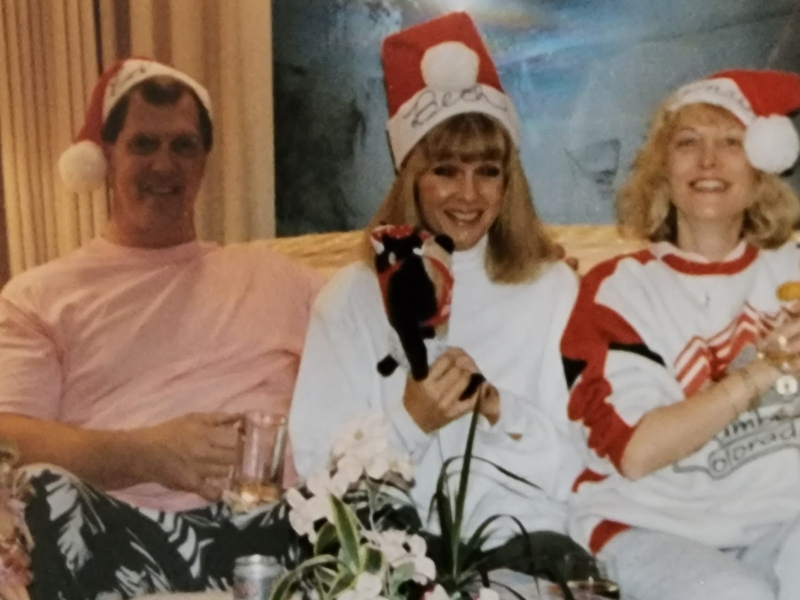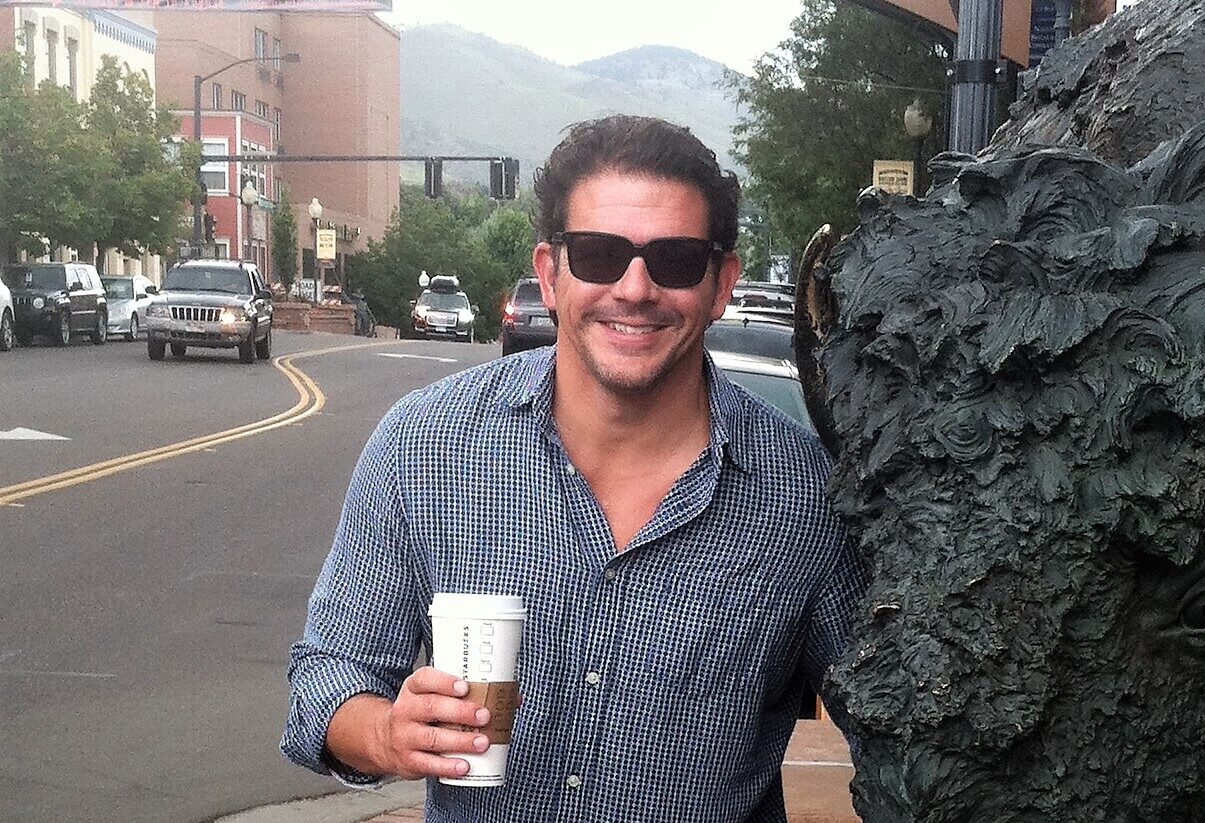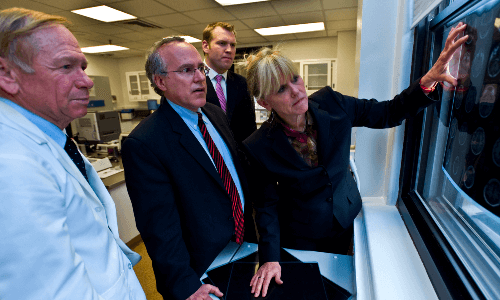Edward Lothamer was a “gentle giant” who played eight seasons in the NFL as a defensive tackle for the Kansas City Chiefs. After retiring from football, Lothamer pivoted to a career in the heavy equipment business and became successful due to his perseverance and determination. He was also a people person, making time for all who crossed his path, from family, to friends, and even complete strangers. Later in life, he had trouble concentrating, and found it difficult to perform previously normal functions such as walking or speaking. Lothamer passed away on June 19, 2022, at the age of 80. His family later donated his brain to the UNITE Brain Bank, where researchers diagnosed him with stage 4 (of 4) CTE. Below, his daughter Ryan shares her father’s powerful Legacy Story.
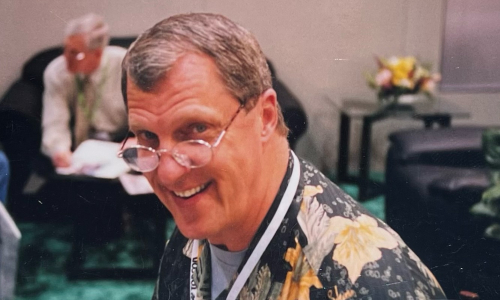
Ed was born in Detroit, MI in May 1942. He was the only child of Edward Sr. and Barbara. As a young man he was dealt a lot of challenging hurdles. His mother, who was his only parent present in his life for the most part, was stricken with cancer in her 30’s and so she and “Eddy” moved in with his maternal grandmother to help ease the burden of supporting his ill mom and himself at that time. His grandmother was the one person he credited for raising him. Those of us who knew Ed believe that that strong female influence molded him into the exceptional man he turned out to be.
Ed thrived in basketball and football his teenage years, with his height reaching 6’5″. He attended Redford High School in Detroit from 1956-1960. He earned a football scholarship to Michigan State and played for the Spartans from 1960-1964, earning his degree in Education. Due to his family’s ongoing unfortunate circumstances, they never saw Ed play a game in college. In 1964, Ed was drafted by both the Baltimore Colts and the Kansas City Chiefs. He was preparing for the move to Baltimore when Lamar Hunt, the owner of the Kansas City Chiefs, showed up at his dorm room and convinced him to come and play for Kansas City instead.
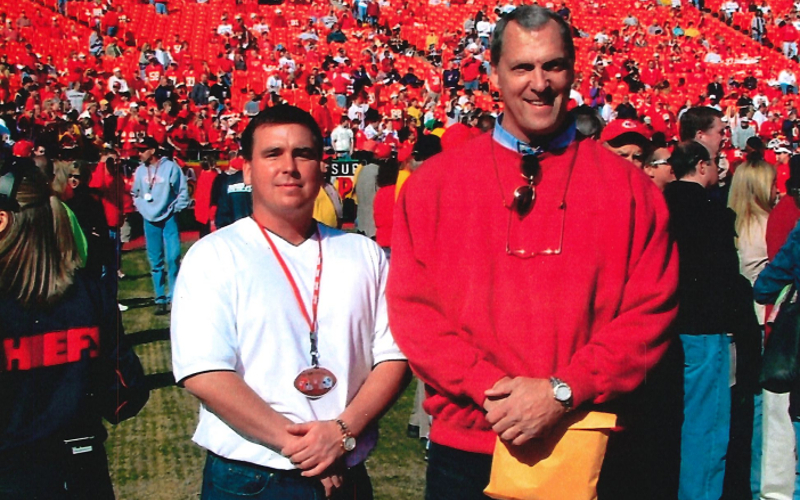
Ed played the majority of his professional career as a defensive tackle, #82. He played for eight seasons and enjoyed a lot of memorable bonds with his teammates during those years and beyond. Kansas City became home for Ed throughout those years with the Chiefs. In the offseasons he owned a couple of popular nightclubs to make ends meet for his growing family. Ed loved music his whole life, especially live bands, and talked of spending many long evenings hanging out with the singers and bands he hired from all different places, to play in his bars.
In March 1971 he married the love of his life, Elisabeth. He retired from the Chiefs the first time that year, but his coach, Hank Stram, asked him to reconsider and come back to play for the team again in the newly constructed Arrowhead Stadium. Ed played that season in 1972, but during a practice he was badly injured and that stopped him from returning in 1973. He made the decision to retire from football and try his luck at a different career.
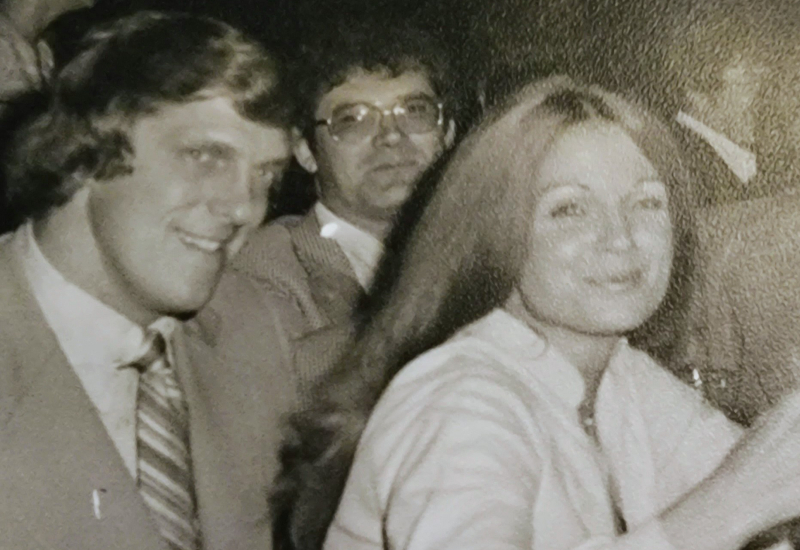
Through his determination, perseverance, and connections in Kansas City, Ed and a partner were able to start a heavy equipment business in 1977, and that company eventually became the largest of its kind in the city and surrounding areas for a number of years. That company grew and expanded to Charlotte, Raleigh, Durham, Tulsa, Oklahoma City, and southeastern Florida with the help of his wife, Beth, and many great people who surrounded him. In 1999, at age 58, Ed sold his companies with the thought of retiring to an island beach somewhere down the road. His 25+ year success in the pumping industry was remarkable and renowned throughout the US, and Ed made many more lifelong friends during those times.
Ed continued to contribute to the NFL through his chapter of the Alumni Organization for the rest of his years. He served as their VP for a while and took much pride in their work for charities of all kinds. He also received a “Father of the Year” honor from the Juvenile Diabetes Foundation for his contributions to their cause.
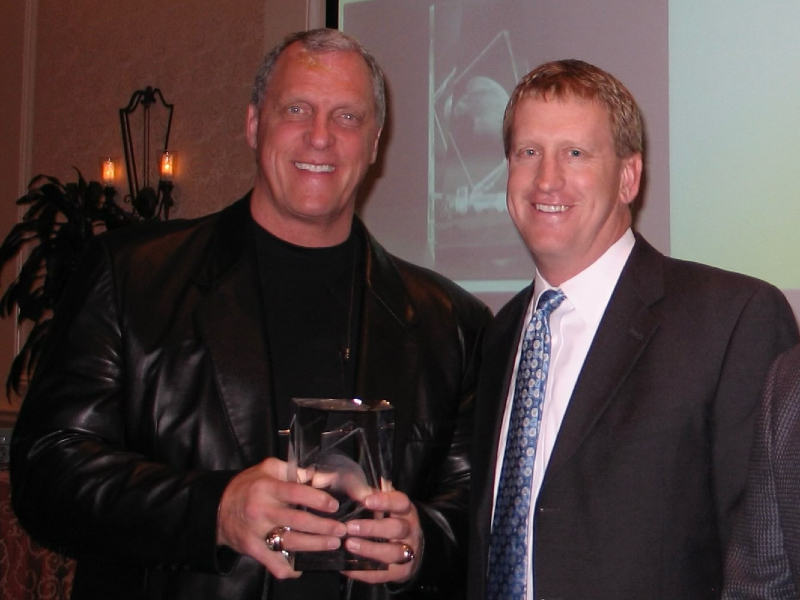
Before CTE completely debilitated his mind, Ed spent a lot of time hanging around his son-in-law’s real estate office, visiting with the realtors, staff, and guests there. He left a marked impression on everybody he struck up conversation with, no matter where it was.
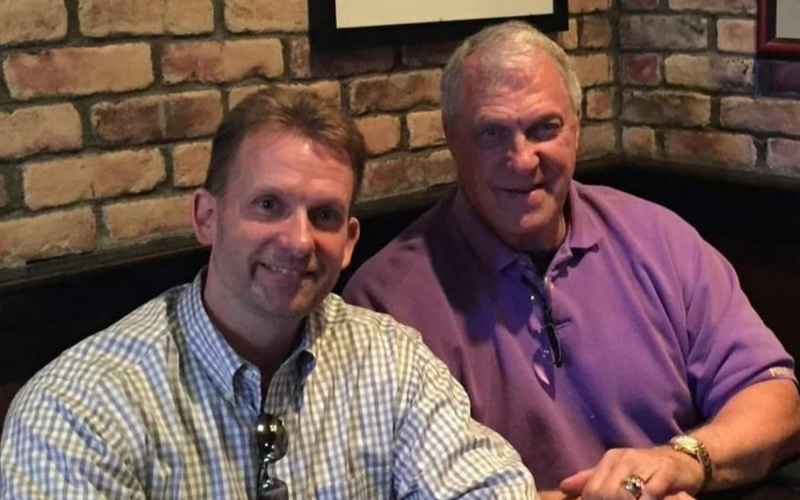
To name the best qualities of Ed would be a list too long to finish. He was kind, comforting, compassionate, fun to be around, and had a way about him that made everyone feel good. He took a true interest in the lives of the people he met and often came to know well. He had a larger than life presence and was incredibly sharp. He had the ability to see all sides on issues and never judged anyone for being who they were. He was a “gentle giant” who loved laughing and learning new things. Before CTE stole his ability to concentrate, he read a lot. He was of the mindset that the world was full of secrets just waiting to be found out and that magic and miracles happened everyday. When he was younger, he stayed in fantastic physical shape and encouraged others to do the same. He loved to travel and see new things, but mostly he delighted in making others happy. Ed connected with other human beings on a level that could rarely be matched and had an understanding and acceptance of the imperfections that come with this earthly existence. He was an extraordinary character who related to the entire spectrum of souls he encountered. He was an exemplary man and that never wavered.
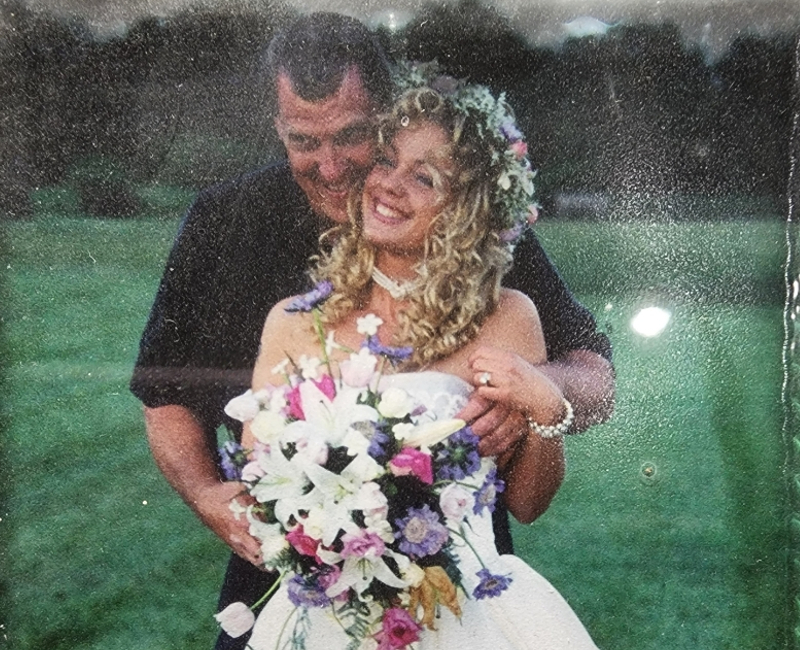
My father died on June 19, 2022, at a rehab facility following a two week hospital stay. He had been sleeping up to 20 hours a day before his death, had a Parkinson’s tremor, could not stand or walk, could not carry a conversation or speak, could no longer eat, and had finally lost all of the will he had fought like a soldier to maintain throughout his journey here on Earth. The man we loved, deeply admired, and relied on for so much of our lives had slowly and painfully disappeared in front of our eyes. His condition was finally irreparable.
We donated Ed’s brain to the Concussion Legacy Foundation per his wishes. He wanted his brain to be studied because we now understand he was aware that its functions were compromised for many, many years after football. His desire was to help others, whether athletes, military, or anyone who had dealt with multiple concussions like he had. We, his family, also believe that he too wanted to give us a last gift of knowing his truth. Dad had been in steady and then severe decline for the last 15-20 years of his life and watching the destruction his brain injuries had caused him, and in turn his family, was agonizing for all of us. We were told he had some type of “dementia,” with some forward thinking doctors alluding to possible CTE and he had gotten a number of opinions over the years about his volatile and diminishing condition. No medicines helped him and no treatment options were offered to him, so we were finally reduced to just trying our best to protect his dignity and keep him as comfortable as we could with the limited resources we had available. Witnessing the effects of CTE caused my family so much heartache but now reflecting on what it all must have felt like for HIM to endure is much worse for us to accept. His loss, his confusion, his frustration, his isolation, and mostly his fear are utterly devastating for us to think about. We feel deep sorrow and enormous guilt about not understanding enough and not knowing how to ease his affliction. CTE took a man with an epic presence and a discerning mind and minimized him to just a shell of that person. We, as his family and friends, would never wish that on our worst enemies.
After receiving the stage 4 CTE diagnosis from BU and learning more about what my dad was dealing with, many of the things that haunted us and perplexed us about his brain functions and personality changes over the years made more sense. Although knowing certainly does not make it easier to bear for us, it does explain why the problems were present and it gives the “void” a name. We can only wish that he too could have gotten that explanation in life. I know we have been asked the question if we think he would go back and do it all again, knowing this would have been the outcome and ultimately his demise? Only he could answer that with certainty.
The biggest differences between now and the days when my father played football is that for many young athletes, sports can be their way out of poverty and can give them hope for a better life. My father made $42,000 during his final season in the NFL, which we now realize was the price he exchanged for his brain. Knowledge today offers athletes more choices, and so many more safety protocols are in place to protect the players in these times. And the money the league pays the players can mean a lifetime of financial security for them and their families in the present day.
The afternoon that we received the results of my dad’s tests, it was beyond painful for those of us who had loved him during his time here. But it also made me even more proud to be a warrior’s daughter. He was a fighter in all that he accomplished and who he was. Against all odds, my dad had a powerful story to tell. We will make it our mission to tell that story and carry on his legacy for as long as we are capable. I could not be more thankful for him.
Ed Lothamer’s favorite parting words were, “Keep smiling.” We will, dad.
